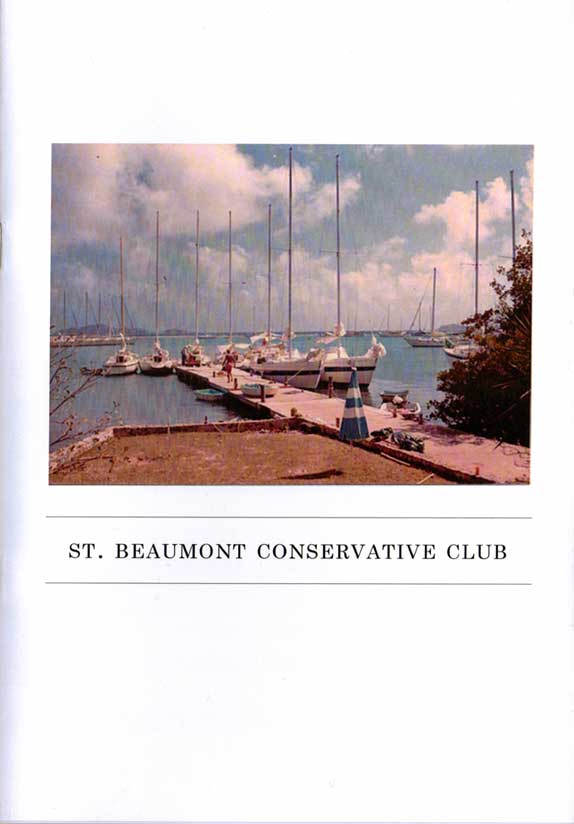A Note on St. Beaumont Conservative Club
Mahmoud Elbarasi's St. Beaumont Conservative Club is a collection of ten lyrics and prayers, addressed to unnamed lovers and unnamed gods. Reveries of self-preservation. They crystallise into historical and psychic facts the transformations of a world whose exteriors and interiors are painfully incongruent. He writes in "#1": "Then I look at the yellow of the mattress, and it turns brown." And in "Breckenridge St., A Light":
Who ever wakes the same man?
my color has changed
The first of these poems was written as the revolution in Tunisia was beginning, a time when the poet's own private life was approaching an unbearable intensity. They express a longing for unjustifiably impossible experience, for personal dissolution into equally unattainable orders of the intimately social and the intimately domestic. They long for a justice which is not legalistic, but spiritual; yet they are scarred by a terror at the metaphysical prospect of being outside, of feeling the pain of exposure to that which is not private. In “Breckenridge St., A Light” we are told: "I was living between hiding places". These are poems of exile, of longing for a homeland from which the poet's paternal bloodline has been (or rather, had been) interdicted. In “B & BS”, a trio of “golden retrievers” is projected onto the empty space reserved for full comrades, those with whose driving belief the poet acts in sympathetic accord, and whom he has “always suspected” would be “flanking me in fall”. And in “Al Marj Road, 222”:
our people are buried in places
we will never smell.
"you can go to hell"
I say that into the mirror,
to you, to me, and to the old earth.
The fear that the constellation of these graves might actually be a map of Hell is compounded by the poet's alienation from his own actual home in the United States. "Stillborn Somewhere" is one of the pamphlet's more forceful titles. So "scotch" and "pink pills" play their part in calming tremoring nerves.
The association of morality with smell (dogs again) is a nomination of the sense of smell as a metaphor for intuitive knowledge of the good, as that which distinguishes the spiritually fresh from the rotten. The pamphlet’s first poem, “Surely, We Are Not Proud of this Compromise”, ends with these lines:
and i wonder what hate is
because I can't quite smell it
The pamphlet’s explicit appeal to a life named by the paraphernalia of bourgeois America is perhaps some kind of distorted courtly gesture, masking the desire to be exiled from that world with all the slowly-acquired bitterness and contempt of the social class whose labour generates that leisure time and violent self-satisfaction which they themselves will never possess. In "B & BS", when the poet throws "a mossed baseball across it all" (that “all” of course including an "invisible fence"), he destroys the reality of his "dream" of that life, in its own mowed front yard, as if throwing the ball (which is no longer itself, but a host for nature's elegant, classless green raiment; none of the cheapness of ornamental grass) through the screen and not just "across it", an iconoclasm of that which is "Just as I had pictured". The trained fantasy of lifestyle-acquisition is theologised as prophetic image, and the fetish items of the target culture become the language of its understated refusal in a final visit to that dreamscape. And it is a very real dreamscape, and they are firing their gardeners.
This refusal has its consequences. In "Al Marj Road, 222", Elbarasi writes:
I could have kissed you night after night after night
without a drink
and here you are
at the scene of a crime.
your property destroyed,
quite simply.
the police care.
that excites me, not all is unwholesome.
The poet wishes himself to be the "private property" of his Earthly love, thusly objectified and subsequently vandalised (because it is a hidden law of private property that its owner's right to it will one day be forcibly defiled), and finally doomed to the tragedy of longing for 'wholesome' salvation in the "care" of the police. That's the price: the oblivion-drive which advertises itself as the third way between an impossible bifurcation of one's hoped-for lives: in this case, transcendence through a social order which is either inaccessible (Libya) or untenable (Kentucky) and transcendence through a romantic love which will never sustain the burden of that unrequited social desire.
we dont talk about the land
that we have never touched.
we touch each other
and abandon those streams.
Against the fear of isolation and obsolescence in a world without memory of these hurts and the byproducts of the poet's requisite convalescence therefrom, these words are material acts. In “Hotel Naderi, Tehran”, tears are "hoarded and educated" into “bone”; otherwise, like everything else, they would merely "spin away upwards" (“#10”). The flame untended into full consumption of its keeper.
There are surely unvoiced songs and unidentified refrains which hang and sway behind Elbarasi's text, and their absence marks the poet's desire for a sphere of sensation which unalienates the interior from the exterior, aligning the desire for human love with the desire for a structure of social experience, a popular spirit, to which he has never had (or found) recourse. Which is why this poet's vision is dazzled by alien visitors.
Once, at night,
changing locations,
I saw gold in the sky, light and dark
gold making love to itself or golds to each other.
I could not tell who or what was winning.
("Breckenridge St., A Light")
Justin Katko, April 2012

